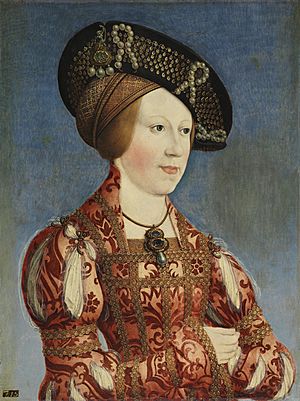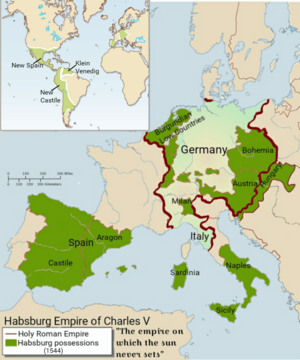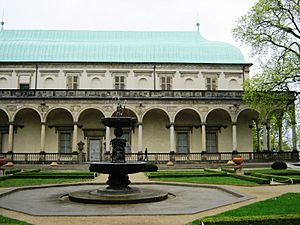Anne of Bohemia and Hungary facts for kids
Quick facts for kids Anne of Bohemia and Hungary |
|
|---|---|

Portrait by Hans Maler, c. 1519
|
|
| Queen of the Romans | |
| Tenure | 5 January 1531 – 27 January 1547 |
| Queen consort of Hungary, Bohemia and Croatia | |
| Tenure | 1526 – 27 January 1547 |
| Archduchess consort of Austria | |
| Tenure | 25 May 1521 – 27 January 1547 |
| Born | 23 July 1503 Buda, Hungary |
| Died | 27 January 1547 (aged 43) Prague, Bohemia |
| Burial | St. Vitus Cathedral |
| Spouse | |
| Issue |
|
| House | Jagiellon |
| Father | Vladislaus II of Hungary |
| Mother | Anne of Foix-Candale |
| Religion | Roman Catholicism |
Anna of Bohemia and Hungary (born July 23, 1503 – died January 27, 1547), also known as Anna Jagellonica, was a very important queen in European history. She became the Queen of Germany, Bohemia, and Hungary, and the Archduchess of Austria. She gained these titles by marrying King Ferdinand I, who later became the Holy Roman Emperor.
Contents
Anna's Early Life and Education
Anna was born in Buda, which is now part of Budapest, Hungary. She was the only daughter and oldest child of King Vladislaus II of Bohemia and Hungary and his third wife, Anne of Foix-Candale. Her younger brother was King Louis II of Hungary and Bohemia.
When her father, King Vladislaus II, passed away in 1516, Anna and her brother Louis were placed under the care of the Holy Roman Emperor Maximilian I. An important marriage was planned for Anna. She was to marry Maximilian's grandson, Archduke Ferdinand of Austria. Ferdinand was the second son of Joanna of Castile, a powerful queen, and her husband, Philip I of Castile.
Anna and her brother moved to Vienna, and then to Innsbruck. Emperor Maximilian didn't visit often, but he made sure the children received an excellent education. They learned important physical skills, like handling weapons and hunting. Their education also focused on problem-solving. They studied dancing and music, and met many smart scholars who visited the imperial library. Innsbruck was also known for its large collection of weapons and growing arms industry.
Anna married Ferdinand on May 26, 1521, in Linz, Austria. At that time, Ferdinand was managing the lands of the House of Habsburg for his older brother, Charles V, Holy Roman Emperor. It was agreed that if Anna's brother Louis died without a son, Ferdinand would become the next king of Bohemia and Hungary.
Becoming Queen of Bohemia and Hungary

A big change happened when Anna's brother, King Louis II, died in 1526. He was thrown from his horse after a major battle called the Battle of Mohács against the Ottoman Empire. Since Louis had no sons, the thrones of Bohemia and Hungary became empty.
Ferdinand, Anna's husband, claimed both kingdoms. He was chosen as King of Bohemia on October 24, 1526, and Anna became his Queen. Hungary was a bit more complicated because the Ottoman Empire had taken over many of its lands. Some Hungarian nobles chose Ferdinand as their king, but others wanted a local ruler and elected John Zápolya. This led to a long conflict between the two sides. Eventually, in 1570, the conflict ended, and Ferdinand's son, Maximilian, became the recognized King of Hungary.
In 1531, Ferdinand's older brother, Charles V, named Ferdinand as his successor to the title of Holy Roman Emperor. This meant Ferdinand was given the important title of King of the Romans.
Anna was a very trusted partner to her husband. When Ferdinand was away, she was sometimes put in charge as a Regent. She also led his Court Council, showing her wisdom and ability to govern. Anna was known for her kindness and charity.
Anna and Ferdinand had a very happy and successful marriage. They had fifteen children! This was very important because the kingdoms of Bohemia and Hungary had struggled for a long time with not having enough heirs. Anna's many children helped secure the future of these kingdoms. Anna served as Queen of Bohemia and one of the Queens of Hungary until she passed away in Prague in 1547. She died just a few days after giving birth to her last daughter, Joanna. Nine years after Anna's death, in 1556, Ferdinand became the Holy Roman Emperor. Even though people suggested he remarry, Ferdinand never did, showing how much he missed Anna.
Ferdinand also built beautiful structures for Anna. He made the Castle of Linz stronger to keep her safe during wars. He also started building the Belvedere, also known as Queen Anne's Summer Palace, in Prague in 1538. It's one of the most beautiful buildings in Prague, even though it wasn't finished until after Anna's death.
Anna's Children
Anna and Ferdinand had fifteen children. Here are their names and some details:
| Name | Birth | Death | Notes |
|---|---|---|---|
| Elisabeth | 9 July 1526 | 15 June 1545 | Married the future King Sigismund II Augustus of Poland; no children |
| Maximilian | 31 July 1527 | 12 October 1576 | Married his first cousin Maria of Spain; had children |
| Anna | 7 July 1528 | 16–17 October 1590 | Married Albert V, Duke of Bavaria; had children |
| Ferdinand | 14 June 1529 | 24 January 1595 | Married Philippine Welser; had children; later married his niece Anne Juliana Gonzaga; had children |
| Maria | 15 May 1531 | 11 December 1581 | Married Wilhelm, Duke of Jülich-Cleves-Berg; had children |
| Magdalena | 14 August 1532 | 10 September 1590 | Became a nun |
| Catherine | 15 September 1533 | 28 February 1572 | Married King Sigismund II Augustus of Poland; no children |
| Eleanor | 2 November 1534 | 5 August 1594 | Married William I, Duke of Mantua; had children |
| Margaret | 16 February 1536 | 12 March 1567 | Became a nun |
| John | 10 April 1538 | 20 March 1539 | Died as a baby |
| Barbara | 30 April 1539 | 19 September 1572 | Married Alfonso II d'Este; no children |
| Charles | 3 June 1540 | 10 July 1590 | Married his niece Maria Anna of Bavaria; had children (including Holy Roman Emperor Ferdinand II) |
| Ursula | 24 July 1541 | 30 April 1543 | Died as a young child |
| Helena | 7 January 1543 | 5 March 1574 | Became a nun |
| Joanna | 24 January 1547 | 10 April 1578 | Married Francesco I de' Medici, Grand Duke of Tuscany; had children |
See also
 In Spanish: Ana Jagellón de Hungría y Bohemia para niños
In Spanish: Ana Jagellón de Hungría y Bohemia para niños
 | Roy Wilkins |
 | John Lewis |
 | Linda Carol Brown |


